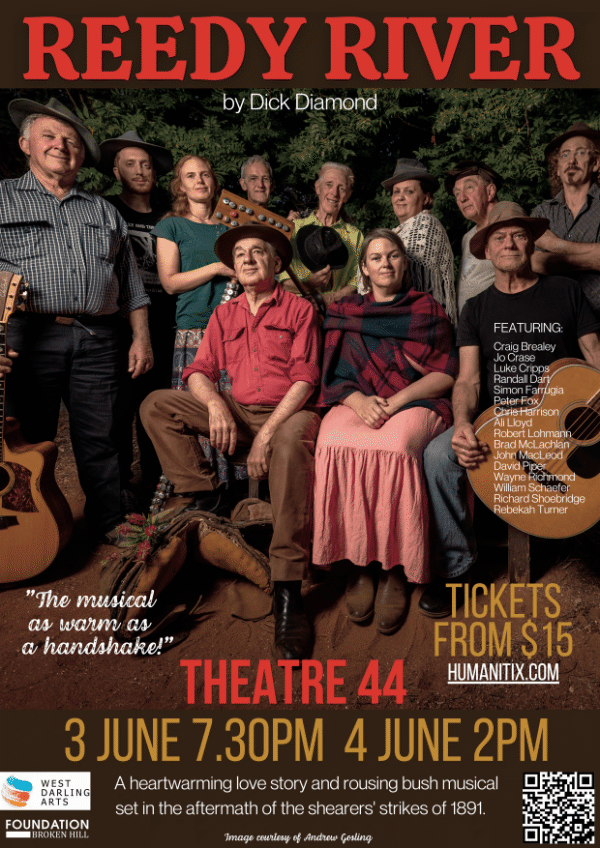
Welcome to the web page designed as a resource for those who participated in the 2023 production of Reedy River in Broken Hill.
Click here to watch a video of the performance.
For more information contact Deb Hunt (0450 169 697)
Songbook & Script
Broken Hill Reedy River Songbook
Broken Hill Reedy River Script
Recordings of songs (from 1988 New Theatre Production)
+ 'Backing' tracks for you to sing-a-long to
Ballad of 1891 (Score with unison bits highlighted)
Lazy Harry's - Backing Backing with extra chorus
Past Carin' (Chris Wheeler recording) - Backing
Four Little Johnny Cakes - Backing
Cast
9 men 2 women. In order of appearance. Characters in bold need to be good singers - especially the shearers & Mary.
Dixon (bullock driver)
Thomo (bullock driver turned shearer)
Nugget (shearer)
Snowy (shearer)
Irish (shearer, Irish accent)
Joe (shearer/bushman - aged 20s-30s)
Mary (Joe's wife - aged 20s-30s)
Brodie (squatter)
Glover (Brodie’s boundary rider)
Bob (swaggie - has two 'character' songs)
Rose (barmaid)
Musicians
Players of 'bush band' instruments such as:
• guitar
• flute
• fiddle
• lagerphone
• penny whistle
• accordion (piano or button)
• concertina
• mouth organ
• washboard
• tea chest bass
• gum leaf! :-)
Auditions
Audititions took place Saturday 25th - Monday 27th February
Click go the shears (to be sung by all applicants)
Misc Resources
Background to the Shearers' Strikes
The action of Reedy River is set in the aftermath of the industrial strikes of 1890 and 1891.
The years between the 1850s gold rushes and the 1890s economic depression were prosperous. Fortunes were made in wool and wheat; the railways opened up the continent and the newly self-governing colonies flourished.
Workers began fighting for better wages and conditions. One of the first intercolonial collectives was the Amalgamated Shearers Union. By 1889 it and the Queensland Shearers Union had 33,000 members; that season more than 90% of shearing sheds “shore Union”.
But things suddenly changed. The land boom collapsed and thousands of speculators went broke. With falling prices for Australian wool, squatters decided that renewed profitability lay in “freedom of contract”: the boss was free to choose whom to hire and the worker free to starve if he didn’t like the deal.
In 1890 an attempt was made to defeat the “Union shed” in Queensland, but disunity among employers gained a temporary victory for the shearers: only union-shorn wool would be loaded by union labour onto union-manned ships.
Again in Queensland, a bitter stoppage began in January 1891 after pastoralists started hiring non-union, often Chinese, labour. Striking shearers made camp at Clermont and Barcaldine, woolsheds were torched, fences destroyed, the Riot Act read, armed troops dispatched by rail, unionists arrested and 12 of them gaoled. By August the union’s money was exhausted and a dispute settlement reached.
In 1894 a Queensland shearers’ strike against pay cuts was short-lived, broken by non- union unemployed wanting work at any wage.
Dick Diamond's Character Notes
Theatre 44 Media Release (12/1/23)
Cast photos below by Ben Yassa